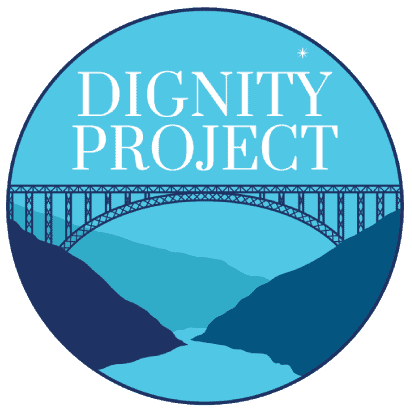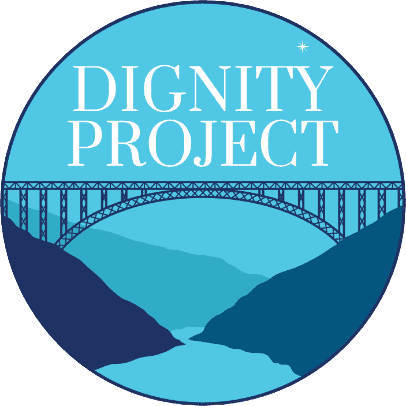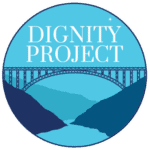
Restoring Opportunity, Empowering Lives

Bridging the Gap
Imagine you’re a single parent, finding yourself in an unexpected and vulnerable position. You’ve found a new job, a glimmer of stability, and a bit of support from public assistance programs. Things are looking up. Your boss offers you a promotion and a raise! But there’s a catch.
This raise could make you ineligible for some of the assistance you’ve been receiving. Worse yet, it doesn’t come close to covering the loss in benefits. You fear losing the safety net that’s maintaining your stability.
You’ve hit a benefit cliff.
So, what do you do?
Many of us would choose stable dependence on public assistance over the unknown of pursuing economic independence. Even if you would keep pushing forward, nose to the grindstone, let’s acknowledge that choosing stability over a raise is a rational decision.

What is The Dignity Project?
Barriers to work, like benefit cliffs, hold many Mountaineers back from social mobility and a brighter future. But we can bridge the gap between dependence and the dignity of earned success by removing barriers to work in West Virginia.
This dilemma is what inspired the Cardinal Institute’s latest endeavor – Dignity Project. We’re delving deep into how large-scale government policies have inadvertently fueled social and economic turmoil in West Virginia.
The Mountain State carries a heavy burden of poverty in its history. The first modern food stamps were distributed in our southern coalfields. Our poverty rate stands at over 17%, and our median household income lags $15,000 below the national average. We’ve had the lowest labor force participation rate in the country for as long as records have been kept.
West Virginia, beloved as it is, has often been a showcase for top-down solutions. The federal government has poured millions into fighting poverty here.
Yet, the struggle persists.

What is The Dignity Project?
Barriers to work, like benefit cliffs, hold many Mountaineers back from social mobility and a brighter future. But we can bridge the gap between dependence and the dignity of earned success by removing barriers to work in West Virginia.
This dilemma is what inspired the Cardinal Institute’s latest endeavor – Dignity Project. We’re delving deep into how large-scale government policies have inadvertently fueled social and economic turmoil in West Virginia.
The Mountain State carries a heavy burden of poverty in its history. The first modern food stamps were distributed in our southern coalfields. Our poverty rate stands at over 17%, and our median household income lags $15,000 below the national average. We’ve had the lowest labor force participation rate in the country for as long as records have been kept.
West Virginia, beloved as it is, has often been a showcase for top-down solutions. The federal government has poured millions into fighting poverty here.
Yet, the struggle persists.
Transforming Barriers Into Bridges
The Cardinal Institute is on a mission to change this narrative and remove the barriers that hold people back from meaningful work. The Dignity Project includes three crucial components:
Data and Research
Partnering with other think tanks, we’ll collect and analyze data. From this, we’ll formulate research that pinpoints the extent of the issue and offers viable solutions.
Community Engagement
We'll take this research on the road, workshopping solutions with those directly affected, build relationships, and fostering a coalition for change.
Education
We'll launch a powerful communications campaign, featuring compelling video storytelling to humanize the issue. We’ll educate stakeholders and connect them to resources that can help them make a difference for those experiencing barriers to work.
What We've Learned So Far
Mountaineers are somewhat optimistic about the direction of WV, but less so for the direction of the US.
Said they were very or somewhat satisfied with the direction of WV.
Said they were very or somewhat satisfied with the direction of US.
Mountaineers are somewhat optimistic about the direction of WV, but less so for the direction of the US.

Issues with drug or substance abuse

Lack of good paying jobs

High childcare costs
What policy solutions Mountaineers support to address benefit cliffs?
People that we surveyed said they support…
Requiring the legislature to conduct a comprehensive review of all public assistance programs in WV every four years
A “one door” policy
Grave period policy for 30-90 days after passing an income threshold
What We've Learned So Far
Mountaineers are somewhat optimistic about the direction of WV, but less so for the direction of the US.
Said they were very or somewhat satisfied with the direction of WV.
Said they were very or somewhat satisfied with the direction of US.
Mountaineers are somewhat optimistic about the direction of WV, but less so for the direction of the US.

Issues with drug or substance abuse

Lack of good paying jobs

High childcare costs
What policy solutions Mountaineers support to address benefit cliffs?
People that we surveyed said they support…
Requiring the legislature to conduct a comprehensive review of all public assistance programs in WV every four years
A “one door” policy
Grave period policy for 30-90 days after passing an income threshold



